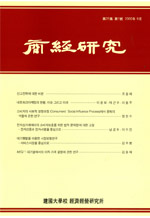경제의 네트워크화와 호혜영역 확장의 경향성
Economy Network and a Tendency of Reciprocity Expansion
- 건국대학교 경제경영연구소
- 상경연구
- 제37권 제1호
-
2012.03171 - 200 (30 pages)
- 22

경제의 금융화를 비롯해 경제활동에서 무형가치의 비중 증대는 경제의 네트워크화를 가속화시키고 있다. 경제의 금융화는 경제 영역간 경계를 약화시키고, 무형가치의 주요 속성 중 하나인 가치결합성은 경제주체 간 네트워크화를 강화시키고 있기 때문이다. 그리고 경제의 네트워크화는 자원배분과 경제활동에서 호혜성의 원리를 부활시키고 있다. 이 논문에서는 먼저 경제의 네트워크화와 경제활동에서 무형가치의 증대가 제기하는 시장이론의 문제 및 한계를 살펴본다. 방법론적 개인주의와 대표행위자 모형에 기초하는 시장이론이 경쟁과 사유재산권에 의해 효율성을 추구하는 반면, 호혜성이 지배하는 이른바 호혜경제에서는 협력과 공유가 보다 효율적인 결과를 만들어낼 수 있음을 보인다.
Today s economy is rapidly networked as the share of intangible value increases in the economy, including the financialization. It occurs because the financialization weakens the boundary of economic sphere and a value connectivity, one of important features of intangibles, strengthens the network of economic agents. As a result of economy network, the principle of reciprocity is revived in resource allocation and economic activities. In this study, above all, I analyze the methodological problems facing neoclassical economics in the network economy and in the increased share of intangible value. While the neoclassical economics based upon methodological individualism and representative agent seeks an efficiency by means of competition and private ownership, I show that collaboration and sharing can make more efficient performance in the economy of reciprocity.
I. 들어가면서: 경제의 네트워크화와 호혜성 원리의 부활
II. 경제의 네트워크화와 시장이론의 한계
III. 협력의 경제학
IV. 맺음말: 혁신과 지속성장 그리고 호혜경제
참 고 문 헌
(0)
(0)